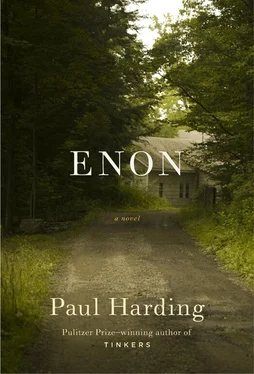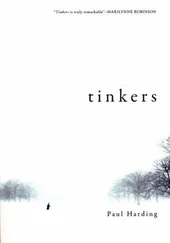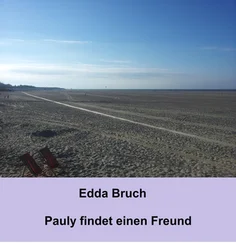Paul Harding - Enon
Здесь есть возможность читать онлайн «Paul Harding - Enon» весь текст электронной книги совершенно бесплатно (целиком полную версию без сокращений). В некоторых случаях можно слушать аудио, скачать через торрент в формате fb2 и присутствует краткое содержание. Жанр: Современная проза, на английском языке. Описание произведения, (предисловие) а так же отзывы посетителей доступны на портале библиотеки ЛибКат.
- Название:Enon
- Автор:
- Жанр:
- Год:неизвестен
- ISBN:нет данных
- Рейтинг книги:3 / 5. Голосов: 1
-
Избранное:Добавить в избранное
- Отзывы:
-
Ваша оценка:
- 60
- 1
- 2
- 3
- 4
- 5
Enon: краткое содержание, описание и аннотация
Предлагаем к чтению аннотацию, описание, краткое содержание или предисловие (зависит от того, что написал сам автор книги «Enon»). Если вы не нашли необходимую информацию о книге — напишите в комментариях, мы постараемся отыскать её.
Powerful, brilliantly written, and deeply moving Paul Harding has, in Enon, written a worthy successor to Tinkers, a debut which John Freeman on NPR called "a masterpiece." Drawn always to the rich landscape of his character's inner lives, here, through the first person narrative of Charlie Crosby (grandson to George Crosby of Tinkers), Harding creates a devastating portrait of a father trying desperately to come to terms with family loss.
Enon — читать онлайн бесплатно полную книгу (весь текст) целиком
Ниже представлен текст книги, разбитый по страницам. Система сохранения места последней прочитанной страницы, позволяет с удобством читать онлайн бесплатно книгу «Enon», без необходимости каждый раз заново искать на чём Вы остановились. Поставьте закладку, и сможете в любой момент перейти на страницу, на которой закончили чтение.
Интервал:
Закладка:
“Are those the vitamins?” Mr. Wallace asked.
I said, “Mr. Wallace, if you pick at those staples, you’re going to get an infection and that’ll be twice as worse, and you’ll have to deal with all that mess even longer.”
Mr. Wallace took one of my hands in his, squeezed it, nodded, and said, “You’ve always been such a good son.”
A woman’s voice called from the top of a servants’ staircase I hadn’t noticed at the back of the kitchen. “Arthur? Ms. O’Keefe? Arthur, are you down there?” Footsteps started down the stairs.
Mr. Wallace answered, “Joanie, I’m here in the kitchen. Kyle’s here. He’s helping get these staples out.”
The woman, Mrs. Wallace, called from halfway down the stairs, “Arthur, stop !”
Mr. Wallace looked back at me. His confused, uncomprehending look vanished for a moment, and he cradled the back of my head with his free hand, squeezed my hand even tighter, smiled, and said, “You were always such a good brother, Warren.”
Mrs. Wallace reached the bottom of the stairs, saw me in my dark hood crouched next to her husband, and began to scream.
I raised Mr. Wallace’s hand to my lips and kissed it and said, “You were a good brother, too, Art.” I ran across the kitchen, through the mudroom, and bolted across the lawn, back into the trees.
After crashing through the woods for ten minutes, tripping over fallen tree limbs and getting my hands and face lashed with thorns, I stopped to catch my breath and listen for anyone pursuing. The sirens and shouts and barking hounds I feared never came. Except for my own gasping, the night was quiet. Clouds still covered the sky, and the temperature had cooled almost to freezing. It took me a moment to figure out roughly where I was. I’d often daydreamed about the earliest beginnings of Enon, before there were roads, the general sense of direction or proximity to a homestead indicated by marks carved or burned into some of the trees. There must have been few trips at night, through the dense, original forests, the world so quiet back then that the open space above the lake a mile away could be heard. The first glimpse of light from a house through the trees would mean a return to food and warmth and shelter that would not have been taken for granted. But as I imagined myself a man returning to his home through the woods in the cold four centuries ago, I understood that those comforts were given meaning only because Kate and Susan were in the house, Kate perhaps already in her bed, which had been placed nearer to the fire than usual because of the terrible cold spell that had gripped Enon since the New Year, Susan sitting in a plain, hard chair placed on the other side of the hearth, darning. Susan and Kate in the home catalyzed the potencies of the light and warmth and food. But with Kate dead and buried in the hill across the village and Susan gone back to her ancestral home, and me stumbling away from robbery, light and warmth and food lost their meanings, and there was no reason anymore even to try to find that Puritan home in the darkness. There was no reason to prefer that idea of home to a cleft in an oak or a hollow beneath a granite boulder. The house fell dark. It went cold. Rats ate the apples in the basket and the wheat in the sack. The house became a dark box of wood in a dark clearing and it was best to look at it from the dark trees. Raising the house had been audacious and the blessings it had been meant to preserve — to hoard, it seemed in retrospect — had not simply vanished but decayed into cursedness. The house had not merely lapsed back into the equilibrium of the woods but was blighted, as if inside it did not contain a hearth and a chair and a bed but my cankered heart. Or I carried the blackened house inside myself instead of a heart. The idea of entering the house and walking over the dark threshold and sitting in the dark room, on a dark chair, by the dark hearth, and looking through a window with broken panes, back out at the perimeter of dark trees, seemed like damnation.
By the time I arrived home from breaking into the Wallaces’, I was in a state that felt close to the onset of real withdrawal. Damned or not, I entered the house and went straight to the living room and sat on the couch and emptied all of the treasure I’d found from my pockets and laid it all out in front of me across the coffee table. I opened the bottle of cough syrup and took a large swig from it. I lit a cigarette and took a swallow of whiskey from the bottle. I took a muscle relaxant and ground two of the instant-release painkillers with the bottom of a highball glass. I rolled up a dollar bill and snorted the pills. I emptied the rest of the pills onto a magazine and ground them up, too, and put the powder into a small plastic bowl and added a couple teaspoons of tap water to it and mixed it together and put it in the freezer.
I went back to the living room and sank back on the couch and had another pull from the whiskey and surveyed my take. The drugs began to take effect and I did not think about the poor Wallaces or the dark house or my dark heart but only about how set I was for a while now. I thought about that in wholesome terms, as if I were for the time being out of danger of something like malnourishment or from a debilitating disease for which I needed a great number of powerful and usually prohibitively expensive drugs. I compared myself to an innocent, sick child while I finished the whiskey and took a couple more pills and had another shot of the cough syrup. I compared myself to an impoverished, desperately sick orphan and I did so with the purest sincerity and charity toward myself until I lost consciousness and fell off the couch.
I woke up on the floor the next afternoon, vomiting. I lurched to the bathroom and finished being sick and drank water out of the bathtub faucet and stuck my head under the water. Volleys of pain exploded through my head, and my stomach felt as if it were knotted full of writhing eels. Shame overwhelmed me, and a line from a poem I could not recall, about remorse being the adequate of hell, repeated itself over and over.
11
RUMMAGING THROUGH THE GARAGE ONE NIGHT SOMETIME later in the spring — one morning, really; it must have been around four — for what I no longer remember: a monkey wrench I had suddenly been convinced I needed, an orange extension cord — I found the old fishing gear we used to take up to Maine when my grandfather was alive. The equipment had been my grandfather’s, and when he died I had held on to it, intending to take Kate up to the camps we stayed at and to teach her how to fly-fish for brook trout. There was a mustard yellow tackle box, full of reels and leaders and small folding knives and needle-nose pliers, line cleaner and fly dressing and the metal tins in which we kept our fishing flies. There was an old cardboard file box, full of survey maps of where we fished, which were so detailed that we could even find the cabins we stayed in on the pond, and outdated Maine atlases and rain ponchos and a pair of wool socks and a couple of flattened baseball caps, and the fishing vest my grandfather had always used, which was fitted with a carbon dioxide canister so that, if he ever fell out of his boat into the pond, he could pull an orange rip cord at the front and it would inflate into a life jacket. The inside of the garage felt cool and clean. It gave off a clean, chaste smell that I attributed to the whitewashed drywall and the smooth concrete floor. The backyard was still draped in darkness but pitched just on the bevel of sunrise. I stepped over boxes full of old clothes and dishes to the front corner of the garage, where the fishing rods in their aluminum tubes leaned in a pile. There were ten tubes, each about chest-high. Each had a screw-top cap. I pulled the tubes toward me in a bundle and looked at their caps and found the one etched with the words To Geo. W. Crosby, from “Skunk” Morell, 1983 . My grandfather’s closest friend, Ray Morrell, had made the rod for my grandfather, out of graphite, with which at the time both men had been enthralled, and for which both immediately forsook their older English and Scottish cane rods. I leaned the other rods back in the corner and unscrewed the cap of the case and drew out the nylon sheath in which the two pieces of the rod were bagged (my grandfather and Ray had both been smitten, too, by nylon, although I always liked the faded brown, quilted, cotton rod bags in which the older rods were stored). I slid the halves of the rod out of the sheath. The rod was a green so dark that it looked black unless it caught the light at a certain angle. My grandfather had taught me to always take the ferrule at the base of the top half of the rod and place it alongside the outside of my nose and give it a couple of turns because the oil from your skin helps the pieces fit together and prevents the bottom half of the rod from splitting when you join it to the top half. Rolling the ferrule upside our noses was, I imagine, as practically useless as it was religiously observed every time we fished.
Читать дальшеИнтервал:
Закладка:
Похожие книги на «Enon»
Представляем Вашему вниманию похожие книги на «Enon» списком для выбора. Мы отобрали схожую по названию и смыслу литературу в надежде предоставить читателям больше вариантов отыскать новые, интересные, ещё непрочитанные произведения.
Обсуждение, отзывы о книге «Enon» и просто собственные мнения читателей. Оставьте ваши комментарии, напишите, что Вы думаете о произведении, его смысле или главных героях. Укажите что конкретно понравилось, а что нет, и почему Вы так считаете.












